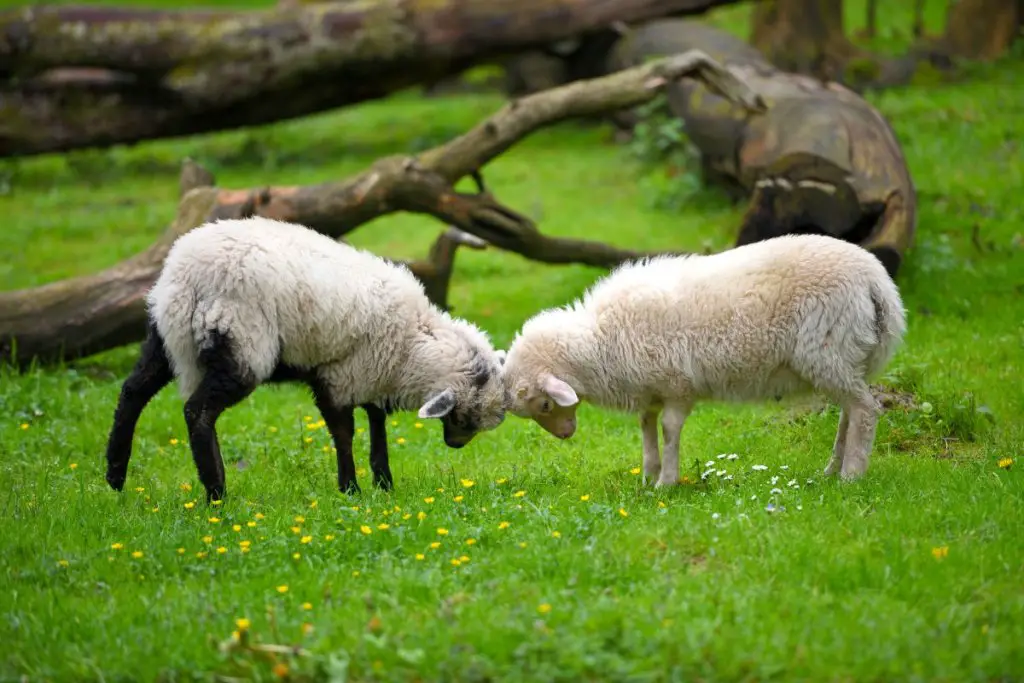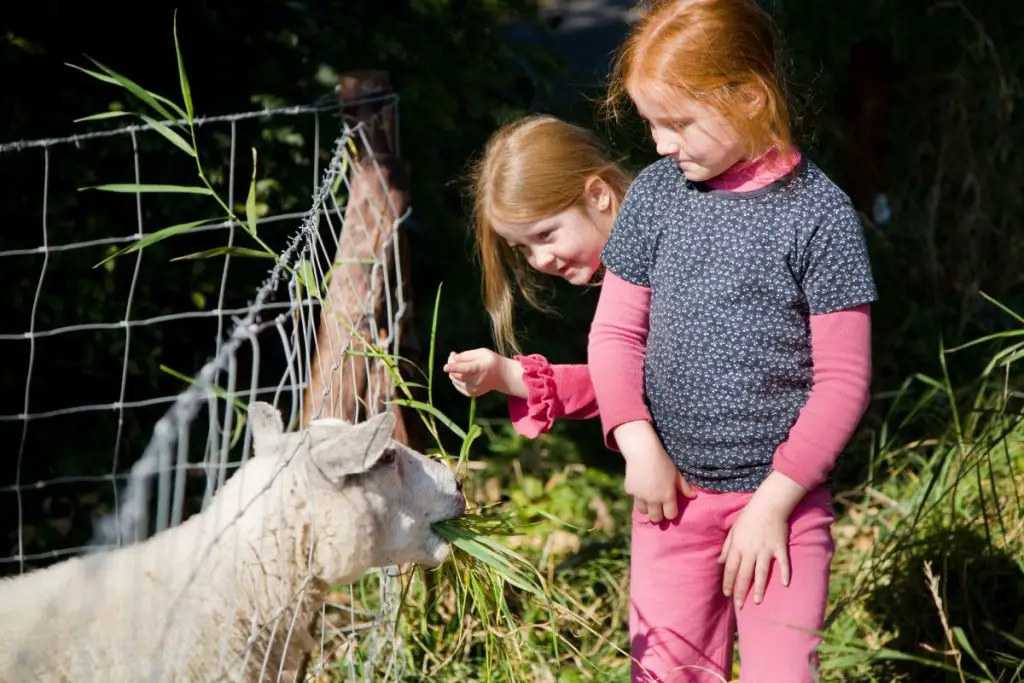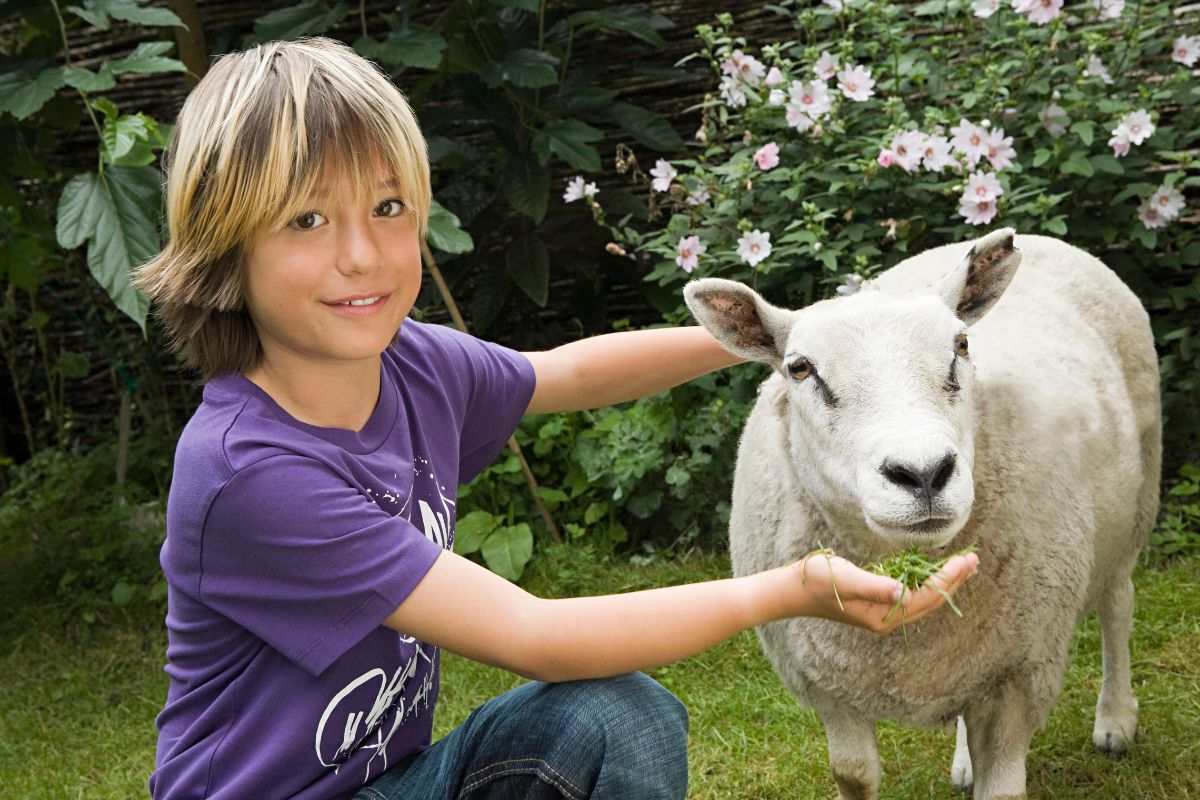Sheep are very friendly and social beings who are rarely aggressive towards humans. However, they make terrible pets for suburban backyards but can do well on farms as companion animals for children.
Domestic sheep are friendly and docile farm animals, but can they also make good pets? This guide answers some questions about sheep as pets, including:
- Why do sheep like to be around humans
- How trusting and affectionate they can be
- What lambs and adult sheep need in terms of space, supplements, etcetera
- Which sheep companion animals you should keep
You’ll also explore the potential cons of keeping sheep as pets.
Table of Contents
Why Do Sheep Like Humans?
Sheep were domesticated around 10,000 years ago. Therefore, it’s safe to say that today, not only can they be around humans, they need human care to survive. Sheep farming has been present for a long time, and raising sheep continues to be a lucrative business among breeders.
Do Sheep Like to be Around Humans?
Lambs are social animals and they enjoy human contact from a young age. If you get them accustomed to people early on, they will enjoy living near humans.
They can recognize people’s faces, and typically bond with both their owners and frequent visitors. On the other hand, they can grow to be untrusting and afraid of people if not properly socialized at a young age.
Are Sheep Friendly to Humans?
Sheep that are used to human contact are friendly to people and like being petted, often showing affection through touch. An affectionate sheep will be relaxed in your presence, follow you around, ask to be petted, and rub against you in return.
Female sheep (ewes) and neutered males (wethers) make great pets, yet intact male sheep (rams) can be aggressive. This can be dangerous, especially if they’re horned. Make sure that all the sheep in your flock are polled to avoid the potential of the horns hurting farm owners or visitors.
Can Sheep be Playful?
Happy, healthy sheep are playful and curious animals. Although lambs can be skittish, they’re usually interested in their surroundings and people from a young age. Lambs initiate playtime by kicking their hind legs up in the air. When they grow up, this behavior is usually replaced by jumping or running around.
Sheep can play with their peers or humans. If a lamb wants to play with you, you can participate by running away from it and chasing it. Watch out for head butting though, as this is usually a sign of dominance instead of just being playful, especially in male sheep.

While sheep typically can’t hurt you, headbutting may become dangerous as they grow older and gain weight. Headbutting easily knock down a child and smaller adults too.
Are Sheep Trusting?
Lambs learn to recognize and trust their owners quickly, often forming a lifelong bond. A sheep who trusts you will see you as their shepherd and greet and follow you when it sees you.
Can Sheep Bite?
Although sheep can bite, they rarely do so as it’s hard for sheep to bite due to the characteristic flat palate on their upper jaw. A scared sheep is more likely to withdraw from attempted human contact than bite someone.
Sheep and Children
Lambs make great pets and get along well with kids. Children will enjoy giving lambs treats and taking care of them according to their age. Both boys and girls from the age of 5 can help with bottle feeding a lamb, but as with many other farm animals, make sure never to leave young kids unsupervised.

Just like any pet, owning a sheep is known to reduce stress while developing empathy and compassion among kids. Children are taught responsibility while gaining physical activity with playtime. Deworming is necessary if you keep a sheep as a pet, for both the sheep’s and the kid’s wellbeing.
Sheep Raising Necessities
Here’s a list of the basics to keep in mind if you’re raising sheep as pets:
- Half an acre to an acre of land in the shape of two paddocks for a small flock of up to six sheep
- Barns that can be closed at night or electric fencing for protection from coyotes and other predators
- Regular vaccinations and deworming
- Grain supplements for young lambs or elderly sheep
- Annual shearing for wooled sheep such as Merino (consider hair sheep, as they can be low-maintenance because they don’t require shearing)
Which Animals are Good Companions For Sheep?
We’ve compiled a list of ideal sheep companions:
| Great | Guard Dogs, Goats, Cattle, Donkeys, Horses, Llamas and Alpacas |
| Good | Chickens, Ducks and Guinea Pigs |
There are multiple benefits to raising sheep with companion animals:
- Sheep are social animals who get along well with other animals and humans. Raising them with companions improves their socialization, making them friendlier and calmer in general.
- You’ll maximize your space usage and rotational grazing. This helps with parasite prevention in the soil due to the different grazing patterns of various animal species.
- Sheep have little to no means to protect themselves against predators. While working dogs are excellent, alpacas can also be helpful to keep smaller threats such as foxes away.
Can Sheep Be House Pets?
Although sheep are meek by nature and can make good pets, keeping a sheep as a house pet comes with numerous challenges:
| Space | Once fully grown, sheep are big and need a lot of space. You shouldn’t keep only one sheep because it will be isolated without its flock. Fitting a small flock indoors with access to a garden for grazing can be difficult. Plus, some garden plants can be toxic for sheep. |
| Training | House training sheep is hard as well. If you have bottle lambs and start early, you may get more luck with it, but success is not guaranteed. |
| Affection | Unlike dogs, and despite their cute looks, sheep are not really cuddly. At best, they like to be touched and petted. |
| Damage | Furthermore, they have hooves and can damage the flooring. They can also accidentally knock over and break items due to their size. |
| Expense | Sheep can be expensive to buy, transport and feed constantly, especially if you have no natural pastures available. Some breeds also require regular shearing, vaccinations and treatment for parasitic infections. |
| Risk | They can infect humans with zoonotic diseases. You also can’t leave them unattended with young children or simply go on vacation without some planning. |
In summary, keeping a sheep as an indoor-only pet has more cons than pros.
How should you care for an orphaned lamb?
Sometimes an ewe rejects a lamb due to the lamb being born sick, not being able to keep up in the pasture, the ewe getting sick, scent confusion and more.
Unfortunately, if an orphaned lamb is sick, there’s not much you can do. There’s a high probability of it not surviving the first couple of days. On the other hand, if it seems healthy and willing to eat, you will have to bottle feed it every three to four hours.
Orphaned lambs need to be kept warm and this is best accomplished by keeping them indoors temporarily. If you’re worried about cleaning up the waste, some owners will diaper the lamb and cut a hole in the diaper for its tail.
The lamb’s transition from milk to grass and hay is called weaning. Lambs are ready to be weaned once they are four to six weeks old. Make sure they always have access to fresh water once they start weaning. Being accustomed to human contact since its birth, an orphaned lamb will become a great pet but will also consider the feeder to be its mother for life.

